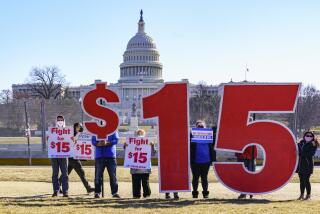The last arguments against raising the minimum wage are gone
- Share via
In a sensible world, the newest government study of the economic effects of raising the minimum wage to $10.10 an hour would end the discussion.
Here are the main points. See if you can guess which one has gotten the most headline play in the news.
1. Wages would rise for 16.5 million workers.
2. Income for families living below the poverty line would rise by a combined $5 billion, and by $12 billion for those earning less than three times the poverty level.
3. About 900,000 people would be moved out of poverty.
4. The raise would reduce total employment by about 500,000 workers.
If you guessed No. 4, have a cookie: You’re an expert in knowing how public policy gets reported in the U.S.
Not only the news media turned their spotlight on those projected job losses. So did the supporters of the raise, including Obama administration officials, who challenged the projection within minutes of its release Tuesday by the Congressional Budget Office.
“Our view is that ‘zero’ is a perfectly reasonable estimate of the impact of the minimum wage on employment,” Jason Furman, the White House’s chief economist, said during a conference call with reporters, citing several economic papers.
As Furman quite rightly pointed out, the employment effect of raising the minimum wage has been studied and debated endlessly over the decades. For the most part, economists have found that increases on the scale being considered in the U.S. -- from $7.25 an hour to $10.10 -- produces “little or no” job losses.
The CBO acknowledges the debate, at least. It actually gives a range of projected job losses of from virtually zero to 1 million; its figure of 500,000 is merely the midpoint.
Why were Furman and other supporters of the raise so quick to push back? The likely reason is that they understood that the job-loss figure would get so much attention. After all, it was the most concise sound bite buried in a fairly technical 39-page document, and in our sound-bite world, the one-celled brain is king.
But the CBO report makes clear that even with a job loss of 500,000 -- in fact, even with 1 million -- the raise to $10.10 is distinctly a net plus to the economy. Overall national income would rise by $2 billion, and the effect on the federal budget would be minuscule. The report also shows that even a raise to $10.10 an hour would leave the U.S. minimum wage lower -- in real, inflation-adjusted terms -- than it was in 1975.
The CBO report creates a big problem for opponents of the minimum-wage increase: What’s the argument against it? They can cite those projected job losses as much as they want, but on the other side are increased wages for 16.5 million people and an end of poverty for 900,000. Sound bites aside, that’s a bargain.
More to Read
Inside the business of entertainment
The Wide Shot brings you news, analysis and insights on everything from streaming wars to production — and what it all means for the future.
You may occasionally receive promotional content from the Los Angeles Times.











